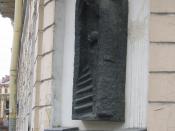In Crime and Punishment, Raskolnikov concocts a theory: All men are divided into 'ordinary' and 'extraordinary'. The extraordinary man should have the right to eliminate a few people in order to make his idea known to all humanity; however, the ordinary man has no right to transgress the law. Because he believes this theory is an idea that must be known to all humanity, he considers himself extraordinary; however, there is a legion of events that prove that Raskolnikov is not extraordinary. One can be sure that Raskolnikov believes himself to be extraordinary when Porfiry says, "...surely you couldn't have helped...fancying yourself...an 'extraordinary' man, uttering a new word in your sense.... That's so, isn't it?" to which Raskolnikov replies, "Quite possibly" (247).
Raskolnikov was strongly prompted to murder Alyona when he recalled a conversation that took place between two ordinary men in a bar. One declared: I could kill that damned old woman and make off with her money without the faintest conscious-prick....
For one life, thousands would be saved from corruption and decay.... Besides, what value has the life of that sickly, stupid, ill-natured old woman in the balance of existence? (63) Raskolnikov reasoned that it would be honorable to kill Alyona since it would supposedly benefit humanity, but the fact that "ordinary" men had the same idea should have immediately put a stop to any thoughts that he was extraordinary.
During Raskolnikov's visit to the police station to retrieve his pledges, he and Porfiry become engaged in conversation involving the theory. Porfiry voiced concerns about ordinary people mistaking themselves as extra-ordinary. Raskolnikov responded with, "...[Ordinary people] might have a thrashing sometimes for letting their fancy run away with them and to teach them their place... (244)". Raskolnikov endured a 'thrashing' of sorts (his illness), but he had...


